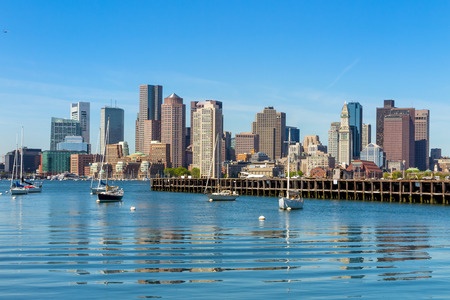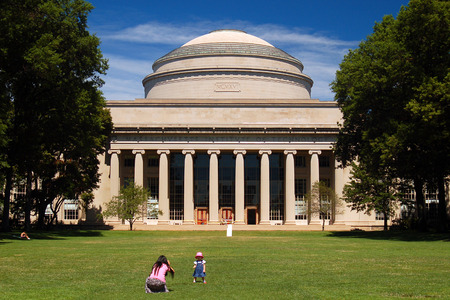As the home of the first New England colony in Plymouth, which was founded in 1620 by the Pilgrims, Massachusetts has been a haven for immigrants since before the United States became a sovereign nation. Massachusetts has a GDP of $493.7 billion and is home to about 6.8 million people as of 2016, making it the most populous state in New England. It is the third-most densely-populated state, and as of 2014, 1,011,811, or about 15% its residents, were foreign-born. As of the 2010 census, 40% of Massachusetts immigrants were from Central or South America, and a large segment of the remainder were from Asia. The state’s metropolitan areas and innovation industries are especially dependent on immigrants, and their contributions across many industries, particularly in STEM fields, make them essential job creators.
Immigration Economic Contribution
 Immigrants drive Massachusetts’s economy forward. Between 2006 and 2010, 50,778 immigrants became business owners in Massachusetts. As of 2010, 17.5 percent of all business owners in the state were foreign-born. 14% ($2.8 billion) of all net business income in in Massachusetts in 2010 was generated by immigrants and their companies.
Immigrants drive Massachusetts’s economy forward. Between 2006 and 2010, 50,778 immigrants became business owners in Massachusetts. As of 2010, 17.5 percent of all business owners in the state were foreign-born. 14% ($2.8 billion) of all net business income in in Massachusetts in 2010 was generated by immigrants and their companies.
Five of the state’s 11 Fortune 500 companies have at least one founder who is an immigrant or a child of an immigrant. These companies earn about $73 billion in revenue annually, and employ over 280,000 people. They include TJX, Thermo Fisher Scientific, Staples, Biogen Idec, and Boston Scientific. This tendency towards scientific fields is a growing trend for immigrants in Massachusetts. As of 2011, over 70.7% of the Boston-Cambridge-Quincy metro area’s H-1B visa holders worked in STEM fields.
Massachusetts is home to the Massachusetts Institute of Technology (MIT), which is one of the country’s most prestigious research universities. Over two-thirds of the patents at MIT, which was the third-highest patent producing university in the U.S. in 2011, had one or more foreign investors. Many of these patents have been licensed by companies or have led to the inception of start-up companies, which in turn lead to job creation, stimulating the economy as a whole. MIT patents earned over $69 million, and its foreign-born alumni have founded over 2,340 U.S. companies, which provide jobs for over 100,000 people.
Overview of Boston
Boston is the capital of and largest city in Massachusetts, and is the 23rd-largest city in the United States. It is the center of the Greater Boston metropolitan area, both economically and culturally. The Greater Boston metropolitan area is home to 4.7 million people, and is the tenth-largest metropolitan statistical area in the nation. As a commuting region, Greater Boston is home to 8.1 million people, making it the sixth-largest combined statistical area in the United States.
 Founded in 1630, Boston is one of the oldest cities in the U.S. It is an international hub for higher education, specializing in medicine, engineering, business, and law, and the city thrives on entrepreneurship and innovation. Boston’s economy is based primarily around biotechnology, business and professional services, government activities, and information technology. Boston residents and companies care about other people and the environment, and the city ranks among the top in the nation for philanthropy and environmental sustainability. Although the cost of living in Boston is high, Boston residents earn a median annual income of $75,667 at of 2014, compared to the national average of $53,657. This means that they can afford a comfortable lifestyle and have the disposable income available to purchase goods and services from immigrant entrepreneurs.
Founded in 1630, Boston is one of the oldest cities in the U.S. It is an international hub for higher education, specializing in medicine, engineering, business, and law, and the city thrives on entrepreneurship and innovation. Boston’s economy is based primarily around biotechnology, business and professional services, government activities, and information technology. Boston residents and companies care about other people and the environment, and the city ranks among the top in the nation for philanthropy and environmental sustainability. Although the cost of living in Boston is high, Boston residents earn a median annual income of $75,667 at of 2014, compared to the national average of $53,657. This means that they can afford a comfortable lifestyle and have the disposable income available to purchase goods and services from immigrant entrepreneurs.
Boston’s Economy
Boston is one of the top 30 most economically powerful cities in the world, making is a global city. The Greater Boston metropolitan area controls about $363 billion, making it the sixth-largest economy in the United States and the 12th largest in the world.
As an educational hub, Boston’s universities and colleges wield substantial economic impact on the regional economy. Over 350,000 students from around the world attend Boston colleges each year. These students contribute $4.8 billion to Boston’s economy each year. Since Boston’s schools are major employers, they attract industries to the city and surrounding region. The city boasts numerous technology companies, and is a hub for biotechnology, with the Milken Institute rating Boston as the top life sciences cluster in the country. Boston receives the largest absolute amount of yearly funding from the National Institutes of Health of all cities in the United States.
Tourism also contributes substantially to the economy, as Boston sees over 21.2 million visitors from around the globe each year who spent over 8.3 billion in 2011. The presence of academia, high-tech companies, an abundance of venture capital, and a vibrant culture that inspires people from around the world to visit, make Boston innovative and ensures that it continues to thrive.
Immigration in Boston
 Boston is incredibly diverse, and its growing immigrant population has a significant impact on the area’s culture. As of 2013, there were over 27,000 Chinese Americans in Boston, and East Boston has an ever-expanding Hispanic community comprised mainly of Puerto Ricans, Dominicans, Salvadorans, Columbians, Mexicans, and Guatemalans. Boston is also well-known for its large Irish (15.8% of the population) and Italian (8.3%) communities.
Boston is incredibly diverse, and its growing immigrant population has a significant impact on the area’s culture. As of 2013, there were over 27,000 Chinese Americans in Boston, and East Boston has an ever-expanding Hispanic community comprised mainly of Puerto Ricans, Dominicans, Salvadorans, Columbians, Mexicans, and Guatemalans. Boston is also well-known for its large Irish (15.8% of the population) and Italian (8.3%) communities.
Assistance for Massachusetts Immigrants
As one of the most diverse and immigrant-friendly states, Massachusetts is home to several programs designed to help immigrants and immigrant entrepreneurs achieve their best lives in the United States. These include the Massachusetts Immigrant and Refugee Advocate Coalition (MIRA), which is “the largest organization in New England promoting the rights and integration of immigrants and refugees.” MIRA is especially well-equipped to help immigrant entrepreneurs establish their businesses in Massachusetts. It operates an online business resource center, which offers information sharing, training, and research for immigrants who wish to establish or expand their small businesses. MIRA helps companies build stakeholder relationships, as it has strong influence within the community and access to tremendous resources to help immigrant-owned businesses thrive, and also helps companies explore non-traditional options for gaining capital. The MIRA sponsors and co-sponsors events and media activities that publicize and promote the contributions of immigrant entrepreneurs across the state and at every economical level, focusing primarily on Massachusetts’ Immigrant Entrepreneurship Month (October 14 – November 14).
Massachusetts is one of the most immigrant-friendly states in the nation, and is dedicated to affording its foreign-born residents every opportunity to reach their business and personal goals. Immigrant entrepreneurs with a focus on STEM fields will find an especially warm welcome, although entrepreneurs in every industry looking for a pleasant lifestyle in an exciting, diverse community would do well to consider making Massachusetts their new home.
About the JDC Consultancy U.S. State Featurettes
Moving to the United States to make a new start as an immigrant entrepreneur is a challenging process. Visa applicants face a huge number of critical decisions before submitting their visa application, one of the most important of which is deciding which State will offer the best environment for their business to grow and thrive, and provide the optimal environment for their families. Each State has its own opportunities and industry specializations, and a company that sees tremendous growth in one State might not see the same results in another.

In order to help its clients decide which State will serve as the most advantageous home base, both for their businesses and their families, and further streamline the visa application process, JDC Consultancy will publish brief overviews of what each State has to offer its immigrant entrepreneurs. These featurettes will showcase each State’s strengths, in this case, Massachusetts, and will provide valuable insight and statistics to help immigrant entrepreneurs make the all-important decision of which State they, and their businesses, should call home.

